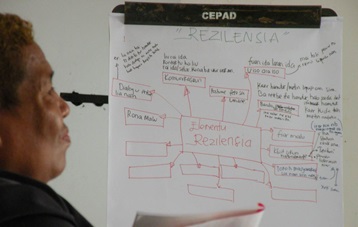Identifying sources of resilience in Timor-Leste

Dili, Timor-Leste
19 February 2015
For immediate release
-The innovative Frameworks for Assessing Resilience project holds the first national validation workshop-
Dili, Timor-Leste - Interpeace's Frameworks for Assessing Resilience initiative, that was launched in 2014, seeks to explore the assets, capacities and processes that make individuals, communities and nations resilient in the face of violent conflict. Unlike most peacebuilding approaches that concentrate on factors of fragility and tension, this initiative emphasizes that all societies possess the assets and capacities to be resilient to conflict. Recognizing these endogenous strengths can better equip societies to find context appropriate and nationally-owned solutions for sustainable peace.
Today, Interpeace's Timorese partner, the Centre for Studies for Peace and Development (CEPAD) is holding the first forum to evaluate and validate the findings coming out of the Frameworks for Assessing Resilience initiative.
“In order to stimulate dialogue on resilience, an unfamiliar concept in Timor-Leste, we engaged participants in a reflection on what enables them to overcome past conflict and prevent it in the future,” explains João Boavida, Executive Director of CEPAD. “Following six months of consultations, our goal is now to unpack the elements of resilience identified and use them to reinforce CEPAD’s peacebuilding programmes,” he adds.
Four key elements have emerged from the research: culture, leadership, religion, and law and security. Community members identified these factors as key to coping with and overcoming conflict. Participants also pointed out that each of these sources of resilience can also be misappropriated in ways that undermine peace.
The national validation workshop marks the culmination of nationwide consultations. These included 15 focus group discussions and 16 stakeholder interviews across every district of Timor-Leste and at the national level.
Today's workshop will bring together 100 participants, including representatives from Timor-Leste’s thirteen districts and key stakeholders at the national level. Together, they will validate the findings of the research, enabling CEPAD to launch the next steps of the Frameworks for Assessing Resilience programme. This second step will involve the creation of a working group composed of national stakeholders. They will be responsible for making recommendations on how to strengthen resilience in Timor-Leste and propose methods to evaluate and measure peacebuilding efforts.
Read the executive summary of the report coming out of the research from Timor-Leste.
About Interpeace
Interpeace is an independent, international peacebuilding organization. It was initially established by the United Nations to develop innovative solutions to build peace. Today it supports locally-led peacebuilding initiatives in over 21 countries across Central America, Africa, Europe, the Middle East and Asia.
About the Centre of Studies for Peace and Development
The Centre of Studies for Peace and Development (CEPAD) is a Non-Governmental Organization in Timor-Leste that was founded in 2008 with the support from Interpeace. It contributes to breaking the cycle of violence and creating a climate in which Timorese can identify and address priority issues in a non-violent and durable manner.
About Frameworks for Assessing Resilience
The Framework for Assessing Resilience (FAR) is a two year programme created by Interpeace and funded by SIDA, to develope tools that deepen the understanding of resilience in conflict affected societies as defined by the population. It focuses on the positive capacities that contribute to resilience rather than sources of fragility of a country. In its first phase it engages local populations in defining and assessing resilience for peacebuilding. Currently this new project is being implemented in Timor-Leste, Liberia and Guatemala.
Media Contacts:
Anupah Makoond
Frameworks for Assessing Resilience Programme Officer
Email: makoond@interpeace.org
João Boavida
Executive Director, CEPAD
Email: joao.boavida@tl-cepad.org
For interview request, please send an e-mail to the media contact.
##
